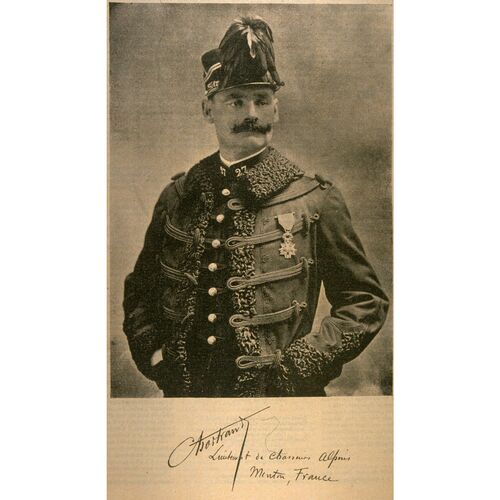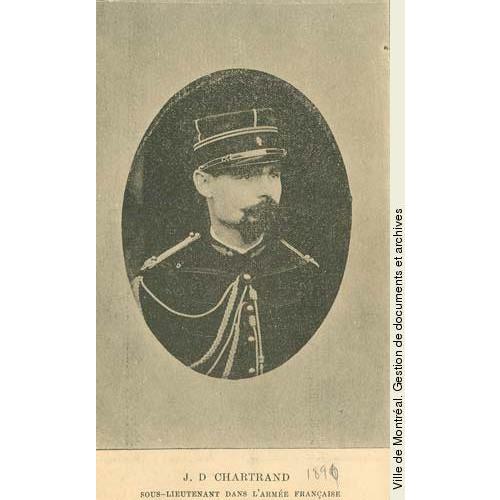CHARTRAND, JOSEPH-DAMASE (baptized Joseph, usually known as Captain Chartrand or Chartrand des Écorres), soldier, accountant, writer, magazine owner, and professor; b. 23 Nov. 1852 in Saint-Vincent-de-Paul (Laval), Lower Canada, son of Joseph Chartrand, a joiner, and Virginie Lacasse; m. 1 Dec. 1883 Ernestine de Latour in Grenade-sur-Garonne, France, and they had three children; d. 2 April 1905 in Kingston, Ont.
After classical studies at the Collège Masson in Terrebonne, Lower Canada, Joseph-Damase Chartrand, the eldest of seven children, left for Toronto at the age of 16, ostensibly to learn English. He went on to Chicago and then to Texas. In 1868, under the name of Charles Carter, he joined the Texas Rangers where he learned the rudiments of military life. On his return to Montreal in 1872, Chartrand enlisted in the Canadian militia and he was in a contingent sent to the Red River settlement in Manitoba to maintain order [see Alexander Morris*]. To get on his feet again financially after he came back, he worked on the log drive on the Rivière L’Assomption and later became an accountant with Le National and Le Bien public in Montreal.
In 1876, proclaiming his boundless love for France, his beloved “former motherland,” Chartrand gave up his captain’s commission in the 65th Battalion of Rifles (Mount Royal Rifles) and abandoned the law course he had begun. He went to New York, where he took passage on L’Amérique for France. When the École Militaire Spéciale de Saint-Cyr would not admit him because he was a British subject, he enlisted as a private in the Régiment Étranger in Algeria. There his determination brought him successive promotions to corporal, quartermaster corporal, quartermaster sergeant, and sergeant-major.
To qualify for further advancement, Chartrand became a naturalized French citizen in 1881 and enrolled in the École Militaire d’Infanterie de Saint-Maixent. From 1886 to 1890 he taught at the École Militaire de Saint-Hippolyte-du-Fort. He was promoted lieutenant in the 161e d’infanterie at Nice, and later in the 27ème Bataillon des Chasseurs Alpins at Menton. Thus he became one of the first Canadians to be given a commission in the French army and to be made a chevalier in the Legion of Honour. This distinction came in recognition of his 14 years of service and the wounds he had suffered in Algeria and Indochina. In 1894 he was made a captain in the 7ème Bataillon des Chasseurs Alpins at Antibes.
Chartrand and his wife took pleasure in entertaining visitors from Canada; among them were Joseph-Adolphe Chapleau*, Honoré Mercier*, Honoré Beaugrand, Hector Fabre, Narcisse-Henri-Édouard Faucher* de Saint-Maurice, and many others. Chartrand also corresponded with his Canadian friends, including Joseph-Étienne-Eugène Marmette, Laurent-Olivier David*, Benjamin Sulte*, and Louis Fréchette.
Throughout his military career and afterwards, Chartrand wrote. He had three volumes published in Paris: Expéditions autour de ma tente in 1887; Saint-Maixent, souvenirs d’école militaire in 1888; and Au pays des étapes, notes d’un légionnaire in 1892. He also did two studies, for which his superiors had high regard, one on the infantry branch and the other on preparatory military schools. In addition, about a thousand of his articles came out between 1880 and 1905 in various newspapers and magazines in Algeria, France, the United States, and Canada, under the pseudonyms Ch. des Écorres, R. de la Pignière, Un ancien officier français, Un ancien légionnaire, Bibliophile, Patriote, and Caliban.
Chartrand wrote about his everyday life, his joys, and his sorrows, all leavened with humour and interspersed with reflections. But even while he was singing the praises of military life, there was an undertone of irony barely masked by the élan characteristic of his style. He was able to laugh at himself and his humour was always topical: “I certainly hope you do not think that a French Canadian can stop halfway on the road to fame. In Canada we all have genius.” This kind of prose, mingling sadness and gaiety, joking and mockery, was well received by the Paris press, and in 1889 the president of the Société des Gens de Lettres in France, Jules Claretie, invited him to become a member.
Despite his military and literary successes, however, Chartrand dreamed of returning to Canada. He wanted to see his beloved country, where “the rivers [are] so cool, so clear, so broad, and so deep, where the winters are so cold, so white, and so long.” Chartrand was a man governed by his passionate nature. Given leave in the summer of 1894 to come to Canada, he decided to stay on. He sent for his wife and two children and, full of optimism and enthusiasm, plunged immediately into creating the independent illustrated literary monthly that was to be the most ambitious undertaking of his life.
Because of the strong current of nationalism at the time, Chartrand christened his magazine La Revue nationale; he chose as its motto, “Strength for the sword, caution for the pen.” But after 14 issues (February 1895 to March 1896), which carried 207 articles by 66 writers, including Arthur Buies, William Chapman*, and Robertine Barry, it ceased publication. It might have survived if La Revue canadienne had not waged such a bitter war against it. A publication of the same size, this magazine, which advocated that literature be subservient to religion and homeland, lowered its subscription rate from $3.00 to $2.50, and then to $2.00, with the assurance that Canon Paul Bruchési* of Montreal would make good any shortfall. Bruchési was concerned that homes were being infiltrated by an independent literature which was freeing itself from the traditional ideology shaped by the church. He advised people, from the pulpit, not to read La Revue nationale and asked parish priests to do so also. In such a climate of opinion the struggle to save the magazine proved hopeless.
Having received so many invitations, so much encouragement, and so many promises, Chartrand became profoundly discouraged. He looked in vain for employment in the province of Quebec. Finally on 1 Sept. 1897 the Royal Military College of Canada, in Kingston, offered him a position as professor of French, and he accepted. An active man of humanistic bent, he found that neither teaching nor his writing for the Kingston Daily British Whig and News and Times, or La Patrie and Le Canada of Montreal, nor even his bridge and billiards, kept him from feeling like an unhappy exile. Suffering from anxiety and from Bright’s disease, he was taken to the Hôtel Dieu hospital in Kingston, where he died on 2 April 1905, at the age of 52. The city was stunned. Everyone knew Captain Chartrand, who wrote articles exhorting universities to set up schools of journalism, who advocated courses for adults at all levels and in all disciplines, and who was distressed to see Montreal turn down the $150,000 offered by American philanthropist Andrew Carnegie to establish, libraries, while Ottawa accepted it.
For 25 years, from 1880 to 1905, Chartrand’s columns had brought a breath of fresh air to the atmosphere of Quebec: “I shout over the rooftops, I create a disturbance, I warn, I caution, I draw attention . . . that is all I can do – being neither a capitalist nor a politician – but I do it as often and as well as possible.” His writings, entertaining though they may be, are more than simply a record of the times: they contributed to the cultural advancement of his country. Chartrand is part of our national heritage and his role as a writer was to awaken minds. Few journalists better merit such an accolade.
Joseph-Damase Chartrand is the author, under the pseudonym Ch. des Écorres, of Expéditions autour de ma tente, boutades militaires (Paris, 1887); Saint-Maixent, souvenirs d’école militaire (Paris et Limoges, France, 1888); and Au pays des étapes, notes d’un légionnaire (Paris et Limoges, 1892). Using various pseudonyms he also contributed about 1,000 articles to a number of newspapers; a complete list of newspapers and pseudonyms can be found in the author’s thesis, “Le capitaine J.-D. Chartrand (1852–1905)” (thèse de ma, univ. d’Ottawa, 1975).
ANQ-M, CE1-59, 23 nov. 1852. AUL, P209/25/8/43–53. Centre de Recherche en Civilisation Canadienne-Française (Ottawa), P224/1. Le Monde illustré (Montréal), 6 sept. 1890, 19 nov. 1892. Honoré Beaugrand, Lettres de voyage: France-Italie-Sicile-Malte-Tunisie-Algérie-Espagne (Montréal, 1889). Canadian men and women of the time (Morgan; 1898), 182. N.-H.-É. Faucher de Saint-Maurice, Loin du pays; souvenirs d’Europe, d’Afrique et d’Amérique (2v., Québec, 1889). L.-A. Lapointe, “Le capitaine J.-D. Chartrand,” BRH, 38 (1932): 242–44. Cosette Marcoux-Boivin, “Le capitaine Joseph-Damase Chartrand des Écorres,” L’Outaouais généalogique (Hull, Qué.), 3, no.1 (janvier 1981): 8–9; Chartrand des Écorres (Hull, 1979).
Cite This Article
Cosette Marcoux-Boivin, “CHARTRAND, JOSEPH-DAMASE (baptized Joseph) (Captain Chartrand, Chartrand des Écorres),” in Dictionary of Canadian Biography, vol. 13, University of Toronto/Université Laval, 2003–, accessed February 20, 2026, https://www.biographi.ca/en/bio/chartrand_joseph_damase_13E.html.
The citation above shows the format for footnotes and endnotes according to the Chicago manual of style (16th edition). Information to be used in other citation formats:
| Permalink: | https://www.biographi.ca/en/bio/chartrand_joseph_damase_13E.html |
| Author of Article: | Cosette Marcoux-Boivin |
| Title of Article: | CHARTRAND, JOSEPH-DAMASE (baptized Joseph) (Captain Chartrand, Chartrand des Écorres) |
| Publication Name: | Dictionary of Canadian Biography, vol. 13 |
| Publisher: | University of Toronto/Université Laval |
| Year of publication: | 1994 |
| Year of revision: | 1994 |
| Access Date: | February 20, 2026 |


![Le lieutenant Chartrand [image fixe] Original title: Le lieutenant Chartrand [image fixe]](/bioimages/w600.5983.jpg)


